Jione Havea (Ed.): MEDIAting Theology (Leseprobe)
This collection engages the challenges and opportunities for doing theology in the context or age of media. The intersection of media with theology is reciprocating: media boosts theology in its functions to inform, connect and educate; theology humbles the globalizing media with a reminder – media is in mediation but not in domination. Media and theology thus intersect at mediating (negotiating, interceding, resisting, protesting) and they should avoid the temptation to colonize. The essays are presented in two overlapping clusters: Mediascapes (intersection of media and a selection of land- and sea-scapes) and Mediations (implications of mediating theology for interrogating hegemonies). The topics addressed include social media and #tag cultures, the fourth industrial revolution and artificial intelligence, homiletics, social resistance, Palestine, Latin America, climate change, and Covid-19.
This collection engages the challenges and opportunities for doing theology in the context or age of media. The intersection of media with theology is reciprocating: media boosts theology in its functions to inform, connect and educate; theology humbles the globalizing media with a reminder – media is in mediation but not in domination. Media and theology thus intersect at mediating (negotiating, interceding, resisting, protesting) and they should avoid the temptation to colonize.
The essays are presented in two overlapping clusters: Mediascapes (intersection of media and a selection of land- and sea-scapes) and Mediations (implications of mediating theology for interrogating hegemonies). The topics addressed include social media and #tag cultures, the fourth industrial revolution and artificial intelligence, homiletics, social resistance, Palestine, Latin America, climate change, and Covid-19.
Create successful ePaper yourself
Turn your PDF publications into a flip-book with our unique Google optimized e-Paper software.
Religion and Media 49<br />
terrible – those are the ones that get shared and shared. Like in evolution,<br />
we are changing arguments to make the worst of themselves and<br />
then share it. This dynamic is leading polarization across the world.<br />
Moreover, the internet is organized by algorithms that are designed to<br />
distribute the most engaging content, the one that compels an emotional<br />
reaction and gets us liking or sharing and promoting those even further.<br />
This dynamic is where fake news comes from, instead of bringing people<br />
together fake news tear the social fabric apart. The World Wide<br />
Web let us form social groups and evolve our prejudice further and further.<br />
While the rise of digital communications blurs the lines between<br />
the transmitter and receptor, our ideas and debates had been radicalized<br />
and polarized to the point of no return. 15<br />
Social media (Facebook, Twitter, Instagram, etc.) put each of us at<br />
the center of an extensive web of connections and make the consequence<br />
of our moral decisions much more immediately manifest.<br />
Instead of hearing about one alarming thing a day, we hear about 500<br />
disturbing things. We are obliged to engage with the dark side of modern<br />
society by clicks and emojis while in the comfort of our private<br />
walls. Humanity is seriously networked together more than we ever<br />
have been, and the subject choices are amplified and distributed not<br />
only far faster than ever but with far more impact.<br />
A few years ago, the interplay between social media and militarist<br />
politics was relatively anomalous, mainly located in the Internet’s margins,<br />
infrequently covered in the media, and poorly understood. Over<br />
these years, the militarization of social media and other digital communication<br />
tools grew on a massive scale, commensurate with the global<br />
spread of social networking and mobile technologies. From the utopian<br />
horizon of a connected world, where information flows freely, a new<br />
level of social engineering has emerged. These past few years have been<br />
a testament to the hijacking of democracies (Cambridge Analytica) and<br />
the interplay between military occupation and digital media as in Israel.<br />
A new type of occupation is taking place in the virtual space of our<br />
sensibilities, the occupation of subjectivity.<br />
In today’s technological landscape, scholars of religion have been<br />
emphasizing the modalities in which religious, faith-based congregants<br />
and laypeople can engage with one another. This process allows for the<br />
deconstruction of lived religion in the twenty-first century as well as<br />
resignifies its importance in everyday life in a way which emphasizes<br />
15<br />
Cf. Bruno Latour and Peter Weibel (eds), Iconoclash: Beyond the Image Wars in Science,<br />
Religion, and Art, Cambridge 2002.
















